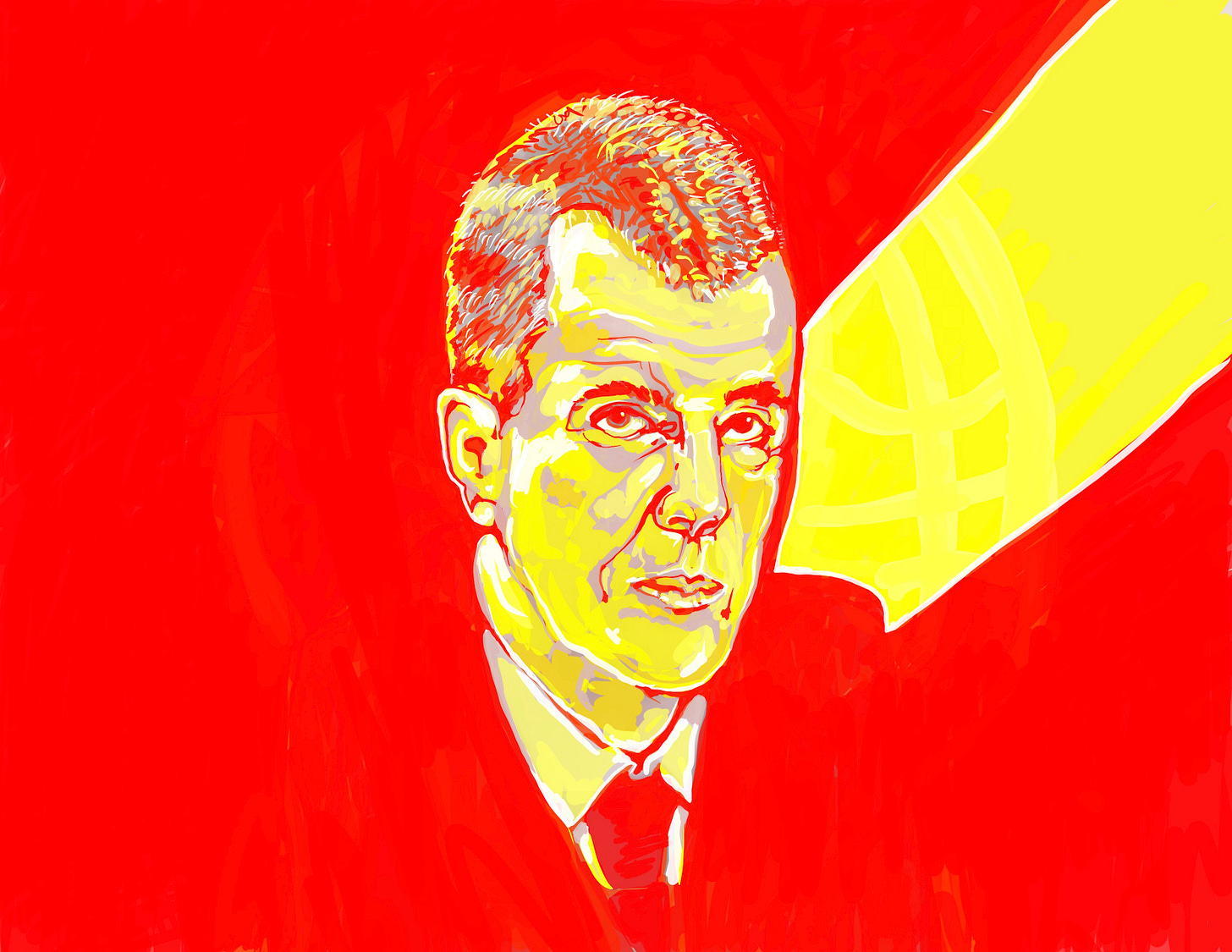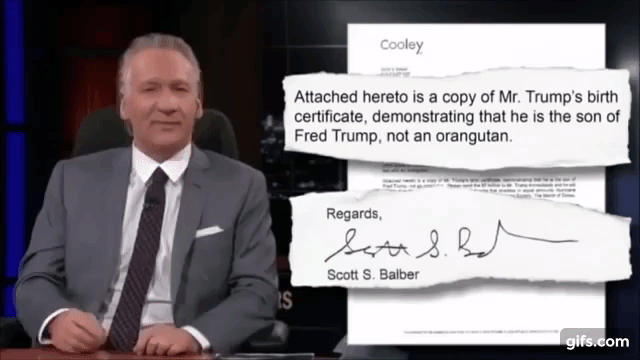Prokhorov and Trump share a lawyer
His name is Scott Balber. Part 3 of a series examining the NBA's oligarch.
By Henry Abbott

“Mikhail Prokhorov”/James Kelewae
There is a street-level lobby in a midtown Manhattan office building with security people who take their jobs seriously. Only after handing over your driver’s license, and some typing, can you get a pass which you need not only to enter, but also to exit. The elevator goes to another lobby on the eighth floor, this one with Cathedral-high ceilings, swimming in natural light. You might then walk around the corner, switch into swankier, quieter elevators, and get the feeling you’ve accomplished something. The instant the doors open on 14, to the New York offices of the London-based law firm Herbert Smith Freehills, the grime of the city is forgotten. It’s a gleaming temple to high-end gloss: tiger-striped blond wood covers the walls, the desks, the conference tables, and the trim of glass-lined halls.
Silence is a myth in New York City. The subway rumbles audibly during the kissing scene in the movie theater. The creaks and whooshes of heating and cooling interlace with the idling trucks, jackhammers, and the JetBlue shuttle approaching JFK. And then there are the sirens.
But on the 14th floor, there is only a receptionist and impeccable quiet. He’s running just a few minutes late. He is lawyer Scott Balber, who would have an incredible phone to bug. His clients include:
Donald Trump in more than one case,
A Russian energy company that got in trouble with the Justice Department for bribes and money laundering,
The father-and-son oligarch team who reportedly instigated the infamous Trump Tower meeting,
The “eighth man” at that meeting, Ike Kaveladze,
And … Mikhail Prokhorov.
Just wait in this conference room. Would you like something to drink? A side table tray boasts tidy rows of Cokes, Diet Cokes, and waters for the taking. I decline. I have a minute to stare out the window, marinating in quiet. I’m about to raid the perfect display of several dozen beautifully sharpened Dixon Ticonderoga “SOFT” pencils, when I wonder: Should I turn off my phone, just to make super sure some high-end snooping thing doesn’t happen? Or is that crazy?
A nicely dressed and important-seeming woman stops in, apologizes that Scott is on the phone. She offers a drink. Twice more in the next few minutes I am offered a drink.
And here is Mr. Balber. Busy, smart, a little sassy, a tangle of earbuds and iPhones and lawyer clothes. He has the air of leering competence that would be right at home in fiction. For instance, remember the lawyer from The Wire?
We’ve done some emailing, but I recap: I’m a basketball writer. I’ve interviewed all kinds of people, and the deeper I dig, the weirder it gets. I’m here, Mr. Balber, as a guy with a job telling NBA fans what matters in their league. And I’d love to understand Mr. Prokhorov’s choices a little better, and perhaps to laugh off the notion that the Nets owner was wrapped up in Donald Trump-Russia drama that was happening on the front page of every newspaper on earth on the September day I visited, and even more now that Michael Cohen seems to be the king of all media.
But dang, I have questions.

Scott Balber was famous-ish, in 2013. Stirring up the racist “birther” controversy, Trump had said he’d pay $5 million to see Obama’s birth certificate, to prove he was born in the U.S. HBO’s Bill Maher was on The Tonight Show with Jay Leno around that time, and did a bit about the color of Trump’s hair. Maher said he would pay $5 million to a charity of Trump’s choosing if Trump could prove he was not the child of an orangutan.
Trump, of course, found some lawyer to write Maher a nasty letter, and they attached Trump’s birth certificate and demanded $5 million. That lawyer was Balber, then working for one of Silicon Valley’s most respected law firms, Cooley LLP. It might be easy to forget now, but the whole back-and-forth earned plenty of air time. On his own show, Real Time, Maher savaged Balber’s letter extravagantly, eventually saying “I ignored his letter, like I ignore all letters from crazy people.”
At one point, Maher made fun of Balber’s signature on the orangutan demand letter. He said it looked like Balber lost conviction halfway through... the “Balber” just kind of trailed off, distracted. Which makes sense. Law.com would later refer to this as “one of the most ridiculous lawsuits of all time.” In his typical work, Balber was perfectly positioned to earn a killing. Why pause that for this?
Lawyers don’t get to choose their clients. Maybe Balber worked for Trump through clenched teeth, you know? But:
June 2013 Aras and Emin Agalarov travel to Las Vegas, meet Donald Trump, secure a deal to host the Miss Universe pageant in Moscow.
November 2013 According to the Steele dossier, Putin’s government collected valuable “kompromat” on Trump in a hotel suite the night after the pageant.
June 2014 Balber and then-wife Elise Zealand judged Trump’s Miss USA contest.
August 2018 Balber is identified as a lawyer for the Agalarovs, and their employee Ike Kaveladze.
Some rich people move assets around, through thickets of paperwork and anonymously named corporate entities, from one country to the next, in almost untraceable ways. Where is that money? We only get small glimpses, thanks to leaks like the Panama and Paradise papers. In the brilliant Moneyland, British journalist Oliver Bullough explains the varied professional services -- legal, banking, and beyond -- that make it all happen. He encourages us to imagine that money in a place that he calls “Moneyland.” Once assets pass there, they’re in a place built on the reality that laws stop at borders, but dollars needn’t.
For lawyers, it’s a much more interesting business than threatening talk show hosts. SO MUCH MONEY is in Moneyland. Bullough cites estimates from American economist James S. Henry that state in recent years, 4 percent of US wealth was stashed offshore, as well as 10 percent of Western Europe’s wealth, 30 percent of Africa’s, 52 percent of Russia’s, and fully 57 percent of the wealth of the Gulf nations. The totals are staggering. French economist Gabriel Zucman estimates that $7.6 trillion of the world-total $95.5 trillion is buried in hard to trace accounts. (If your local school board is short of cash, think of this money. Taxed normally, it would go a long way to solving the globe’s problems.)
And if you knock into trouble with vast amounts of dollars moving in funny ways, Balber is the kind of lawyer with particular expertise. The Herbert Smith Freehills website says the group he created deals with a short list of things that includes “white collar criminal defense.” Recent cases include clients accused of money laundering, insider trading, and racketeering.
But every once in a while he takes on something that would appear to be entirely unrelated. The orangutan was one. Here’s another: Maybe you’ve seen the Oscar-winning documentary Icarus? The star is the former head of Moscow’s WADA anti-doping lab, Grigory Rodchenkov. He confesses in great detail, on camera, to running a massive, state-sponsored, sports doping enterprise. To paraphrase some of Rodchenkov’s claims: Here’s how we mixed up the special dope blend called “the Duchess.” Here’s how we set up the lab at the Sochi Olympics. Here’s the hole in the wall where we secretly passed the dirty vials to secret agents who busted them open and refilled them with clean samples carefully collected in advance. Here is the key government minister who oversaw it all, and, by the way, is still prominent in the Kremlin.
“The doping program at Sochi was a tremendous success,” explains one of the key documents from a pending lawsuit. “Russia achieved historic results with a total of 33 medals—13 gold medals, 11 silver, and 9 bronze—and the Sochi Lab did not identify a single ‘dirty’ Russian athlete. Meanwhile, the lab reported numerous adverse analytical findings for non-Russian athletes, who were consequently excluded from the Games. Russian President Vladimir Putin awarded Dr. Rodchenkov the Order of Friendship, a prestigious state decoration.”
As Rodchenkov tells it, Russia’s FSB (the successor of the KGB) was involved in the scam itself--they opened the allegedly unopenable bottles to swap in clean urine without a trace. Blow the whistle on a project like that and you know two things: 1) people knew about the scam at very high levels of the Russian government and 2) the people at the FSB won’t like it. Julia Ioffe writing in the Atlantic:
“Grigory came to the United States only after a friend of his from the Kremlin told him that the FSB is coming to kill him, that they were going to stage his suicide,” [his attorney Jim] Walden told me.
Shortly after arriving in the United States, Rodchenkov learned that one of his colleagues, former Russian anti-doping agency chief Nikita Kamaev, died under mysterious circumstances. Like many observers, Rodchenkov was convinced it wasn’t of natural causes: Kamaev had been writing a tell-all book about the Russian government’s athletic doping programs.
Will Hobson of the Washington Post writes: “The former head of Russia’s Olympic committee has said Rodchenkov should be shot; two of his former colleagues at Russia’s anti-doping agency have died under suspicious circumstances; and his lawyers believe that Moscow has agents in America searching for Rodchenkov.”
Rodchenkov filed an affidavit in the U.S. alleging all kinds of Russian athletes were doped. Some have been stripped of medals as a result. In response, three biathletes--Olga Zaytseva, Yana Romanova, and Olga Vilukhina--are suing Rodchenkov in New York state court for defaming their good names. Do you want to guess who their lawyer is? Of course, it’s Balber, straying from his area of expertise.
The thing is, those Olgas and Yana didn’t find Balber, and they don’t pay his bills. The person paying the bills, or at least the only one who has been publicly identified, is the man who has long run the Russian Biathlon Federation: Prokhorov.
Forget for a moment that key points in Balber’s complaint echo the points of the Kremlin spokesman, Dmitry Peskov. Also forget the irony of an NBA owner -- one of Adam Silver’s 30 bosses --apparently lawyering up on behalf of a sophisticated doping program.
Focus on this: Rodchenkov lives his life on the run, in hiding, with the belief the Russian government is eager to assassinate him. His lawyer, Jim Walden, has a very sinister interpretation of the lawsuit, telling the Times: “It’s a frivolous suit that I believe is intended to flesh out where exactly he is.”
Vladimir Putin himself has weighed in. Here’s Michael Isikoff writing on Huffington Post:
“What are [U.S. intelligence agencies] doing with him there?” Putin said at the December press conference. “Are they giving him some kind of substances so that he says what’s required?”
Shortly after Putin’s comments, Walden said he was warned by U.S. officials that Russian agents may be looking for Rodchenkov in the United States. Walden, a former federal prosecutor, said he is concerned that the lawsuit is in fact in furtherance of that effort — an attempt “to find him through judicial means.”
Finding out what is true about Prokhorov, or any oligarch, is tough. The system is designed to confuse. “Everything,” says one source, “is true and not true.” What seems undeniable, though, is that we have come a long way from orangutans. The stakes are much higher now. If Walden’s allegations are to be believed, I’m sitting in the offices of a man who has filed legal paperwork, funded by an NBA owner, in the service of assassins.
There’s a lot I’d love Scott Balber to help me understand.
Next week: David Thorpe’s NBA insight, and Part 4 of Henry’s Prokhorov investigation.



